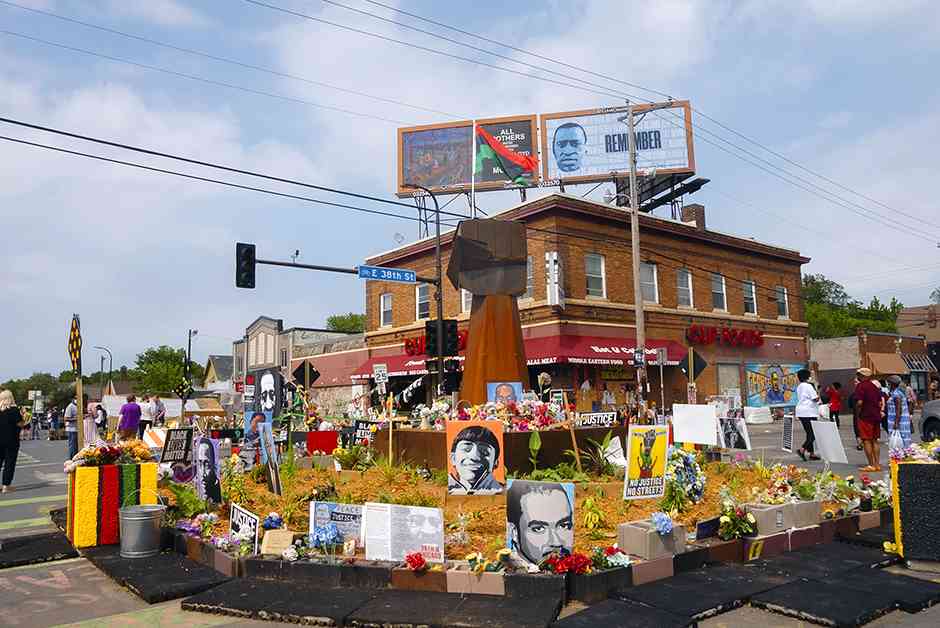A non-profit government transparency organization has taken legal action against a state agency in Minnesota for allegedly withholding documents related to the aftermath of George Floyd’s murder in 2020. Public Record Media filed a lawsuit in district court on Thursday, accusing the Department of Public Safety of failing to produce essential records pertaining to the unrest that ensued after Floyd’s tragic death.
The lawsuit specifically requests the production of transcripts and recordings of interviews conducted as part of an after-action report commissioned by the state agency with Wilder Research. Despite having had two years to provide the requested documents, the Department of Public Safety has either not responded or recently claimed that they do not possess the records in question.
Public Record Media founder and board member, Matt Ehling, emphasized at a press conference held on Friday that under the contract signed between the Department of Public Safety and Wilder Research, all work products and documents generated for the study must be returned to the state promptly upon completion or termination of the contract.
The Wilder report, which was released in March 2022, highlighted various issues, including a lack of communication and coordination during the initial days of arson and looting between the city of Minneapolis, Governor Tim Walz, and his public safety leadership. The report concluded that the events of summer 2020 were significant, unplanned, and unprecedented, urging the state to focus on developing functional systems, plans, and relationships to better respond to civil unrest in the future, particularly in support of communities of color and Black Minnesotans.
However, the report only referred to the individuals interviewed in anonymous terms, such as “state law enforcement official” and “local government official.” Public Record Media specifically sought transcripts or recordings of interviews with key figures such as then-DPS Commissioner John Harrington, then-State Patrol Chief Matt Langer, local police chiefs Booker Hodges and Medaria Arradondo, Minneapolis Mayor Jacob Frey, and Governor Walz.
Despite relying on public government data like emails or text messages, these materials were also not made available to the public. Ehling pointed out that Wilder had been granted unique access to both information and individuals, and while the report itself is public, the data gathered by Wilder could offer valuable insights into the events of those seven tumultuous days in May 2020.
In response to the lawsuit, DPS spokesperson Howie Padilla acknowledged the public’s interest in the data related to the state’s response to the civil unrest following George Floyd’s murder. While DPS is actively reviewing and processing the data involved in the request, Padilla emphasized the importance of ensuring that the information provided is accurate, complete, and compliant with all applicable laws.
Public Record Media’s lawsuit asserts that the state’s failure to provide the requested data in a timely manner violates the Data Practices Act. The organization is seeking the release of the records, an injunction against the agency to compel compliance with the law, as well as reimbursement for court costs and penalties. The lawsuit was filed in Ramsey County District Court against the Department of Public Safety and its current commissioner, Bob Jacobson.
Attorney Tim Phillips, who is representing Public Record Media pro bono, filed the lawsuit. Ehling highlighted the lack of response from the state as part of a broader pattern of government transparency issues within the Walz Administration. Requests for information are often delayed or fulfilled with narrow interpretations of the request and the law, resulting in limited disclosure of relevant materials.
Ehling expressed concern over the growing trend of delayed responses and limited transparency within the current administration, noting that the emphasis on controlling narratives and withholding information is hindering public access to critical data. This pattern, according to Ehling, extends beyond the Walz Administration and is impacting other government entities as well.
Responding to these allegations, Walz’s press secretary, Claire Lancaster, stated that the administration takes government transparency seriously. Lancaster emphasized that the office has provided tens of thousands of pages of data and has implemented measures to expedite responses to data requests. However, she also noted the importance of carefully reviewing requests to ensure compliance with the law and protection of employees’ personal information and sensitive government data.
Public interest and media scrutiny of the Walz Administration have intensified following the Governor’s nomination as vice president on the ticket of Kamala Harris. This increased attention prompted Public Record Media to escalate its efforts to obtain the requested documents, which had been pending for over two years.
Ehling emphasized the organization’s desire to uncover the decision-making processes of top state officials, including Governor Walz, during a pivotal moment in Minnesota’s recent history. Additionally, Public Record Media aims to understand why the data request has been stalled for an extended period, highlighting the need for transparency and accountability in government operations.
The lawsuit filed by Public Record Media underscores the ongoing challenges in accessing public information and holding government agencies accountable for their actions. As the legal proceedings unfold, the outcome of this case could have broader implications for government transparency and public access to essential records related to significant events in the state of Minnesota.

